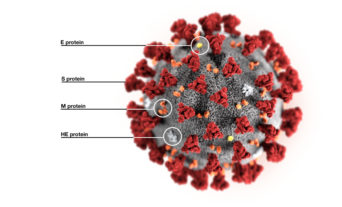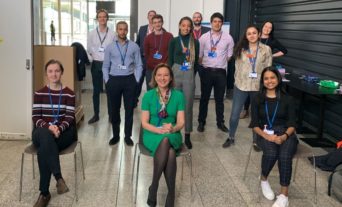Healthcare scientists working in the NHS number over 50,000 and constitute between 5 and 7% of the NHS workforce. This workforce contains over 50 healthcare science specialties divided into four major professional areas: pathology (life) scientists, many of whom are either fellows of the College or come under its auspices as trainees; physiological scientists; and medical physicists including the clinical engineers and clinical bioinformaticians who span all four professional areas.
The commissioning and roll out of the Nightingale hospitals across the country employed expert leadership and skills from healthcare scientists in pathology, clinical engineering, respiratory physiology, cardiac physiology and vascular science.
While many scientists working in pathology may not often encounter acutely unwell patients during their careers, this is not the case for physiological or physical scientists who are critical in caring for patients with respiratory and cardiac conditions or who work in theatres or intensive care. These highly skilled respiratory, cardiac and critical care physiological scientists have proven to be key in working within multidisciplinary teams treating COVID-19 patients with severe respiratory problems by providing non-invasive and mechanical ventilatory support and diagnosis and monitoring of cardiac complications with rhythm management and echocardiography. Clinical engineers are essential in ensuring that all equipment, including ventilators, are safe to use, fit for purpose and are continually maintained. At many Trusts, audiology scientists have been critical to the frontline of COVID-19 testing utilising their patient-facing experience and detailed anatomical knowledge to perform COVID-19 swabs. The commissioning and roll out of the Nightingale hospitals across the country employed expert leadership and skills from healthcare scientists in pathology, clinical engineering, respiratory physiology, cardiac physiology and vascular science.
Pathology laboratories
Scientists within all 29 pathology networks have set up well organised local initiatives to meet the challenge of delivering normal diagnostic services, as well as preparing and delivering COVID-19 testing. Issues such as competencies and experience required of staff including previous RNA/DNA extraction and PCR capability, Cat 3 and PPE capability have been collated and shared within networks. Equipment and consumable concerns and discussions on evaluating and validating results of new COVID-19 assays are also continuously being shared within and between pathology networks.
Scientists working in pathology
There are stories of many scientists working across various pathology disciplines stepping up to the plate during this crisis. Throughout the pandemic these scientists are continuing to provide essential monitoring and diagnosis of all patients in addition to extended molecular and serological COVID-19 testing. It is vital that ongoing scientific diagnostic and treatment services continue to be maintained for urgent and emergency care pathways, including cancer and acute cardiac events. In addition to ensuring that normal pathology services continue, scientists in laboratories are coordinating testing for C-reactive proteins, which is proving useful in evaluating prognosis and monitoring the clinical condition in patients with COVID-19, and for ferritin, which has been found to be elevated in approximately 60% of hospitalised patients with COVID-19 and may be associated with increasing severity in this group. Scientists in some laboratories have introduced IL-6 into the COVID-19 testing panel to further track the inflammatory progress of the disease.
It is vital that ongoing scientific diagnostic and treatment services continue to be maintained for urgent and emergency care pathways, including cancer and acute cardiac events.
Many genetics, molecular pathology and microbiology/virology laboratories have repurposed their scientists and their equipment to run PCR testing to help with COVID-19 testing. Pathology scientists around the country are working with academic scientific colleagues in contributing to many different types of clinical trials including crucial studies to evaluate novel and reliable diagnostic tests for antibody detection.1
In addition to working in their own departments, NHS pathology scientists are helping to train either life scientists who are returning to work or final year STP trainees and other life scientist students who are volunteering to work in Trust laboratories or in the new Lighthouse laboratories by providing them with the laboratory skills and understanding of quality systems to help them support expansion of COVID-19 testing. This detailed training ensures that these volunteer scientists can be placed appropriately for their skill sets, recognises their relevant competencies and coordinates their onboarding and induction into safe pathology scientific testing.
Redeployment guidance and temporary registers for scientists
In recognition of the importance of embedding and supporting the redeployment of healthcare scientists including pathology scientists in new and expanded roles and applying their transferable skills to support the COVID-19 response, a comprehensive document has been produced by NHS England to assist trusts and other organisations in the deployment of scientists in the surge response and beyond to COVID-19.
A four-country document entitled Healthcare Science Workforce Augmentation in response to COVID-19 is due to be published as this report is being written. This document addresses how final year clinical scientists and biomedical scientists will progress onto the temporary HCPC registers to create additional workforce capacity to respond to COVID-19. These registers will also be open to allow re-registration of clinical scientists and biomedical scientists who have left the register over the last three years and will facilitate clinical scientists currently employed in non-clinical roles, either in provider organisations or other sectors, to return to frontline care. This is supported by the frequently asked questions section on the HCPC website.
Rehabilitation and the new normal
Finally, it is becoming clear that when this initial COVID-19 surge declines there will be a requirement to support patients in the community and social care who have had COVID-19 and have been discharged from hospital, in addition to adapting services to work with those at risk of acquiring COVID-19 infection. In this respect, the skills of pathology scientists in providing continuously accurate testing and point-of-care testing will be key as will the skills of the rehabilitation engineers, cardiac and respiratory scientists.



